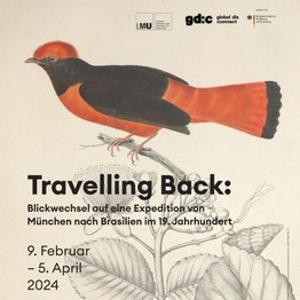
© Käte Hamburger Research Center global dis:connect
Travelling Back is an exhibition that presents a critical perspective on the narratives and collections Bavarian scientists Johann Baptist von Spix (1781–1826) and Carl Friedrich Philipp von Martius (1794–1868) brought from Brazil in the 19th century. The exhibition follows their extensive three-year journey across the Brazilian hinterland, including the Amazonian region.
Spanning 14 000 km, this expedition took place from 1817 to 1820 and was later chronicled in the multi-volume publication Reise in Brasilien (Travels in Brazil – 1823), providing a personal account of the scientists' encounters and perceptions of the country's varied landscapes, cultures and wildlife.
During their travels, Spix and Martius interacted with various indigenous groups and gathered numerous ethnographic, botanical and zoological specimens. These materials became foundational for several Bavarian institutions, like the Bavarian State Collections of Zoology and Botany, as well as the Königlich Ethnographische Sammlung, now the Museum Fünf Kontinente, established in 1862. Beyond tangible artifacts, these collections also treat the history of Isabella Miranha and Johann Juri, two indigenous children brought to Munich in 1820, who died tragically soon after their arrival. Unlike the scientists' evident presence in the city's landscape, the history of these children is marked by silences and absences in public memorial spaces.
The exhibition raises crucial questions about the coloniality underpinning the scientific pursuits of the natural-history project between Munich and Brazil in the 19th century. It examines the various displays and interpretations of Spix and Martius's collections from their arrival in Germany to the present, and it sheds light on the dis:connectivities of knowledge production behind these scientific endeavours.
The idea is not only to inquire into the public reception of these experiences through a history of the gaze, but also to draw a critical examination through the lenses of present-day dialogues and initiatives. This includes new scientific practices of knowledge restitution, literary interpretations and contemporary perspectives from artists like Micheliny Verunschk, Frauke Zabel, Yolanda Gutiérrez, Igor Vidor, Elaine Pessoa and Gê Viana.
Dr. Sabrina Moura, fellow at the Käte Hamburger Research Centre global dis:connect at LMU Munich, is curating the exhibition.
The opening of the exhibition coincides with a one-day conference.
Admission is free. You can find more information on the website of the Zentralinstitut für Kunstgeschichte.
